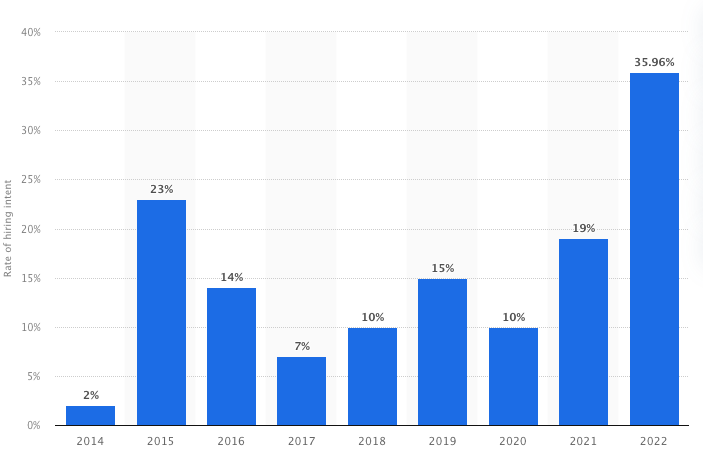
Recruiting is a tough job but also a responsible and satisfying one.
The hunt for the star candidate begins when the moment the applications pour in.
And if you are wondering, "how can recruiters conduct preliminary screening"’ read this post to find answers.
When people are worrying about global issues like climate change and Netflix shows, the much-harried recruiter’s mind is perpetually focused on the only important question that keeps them awake around the clock:
'How to find the right candidate for the job, and how to pre-screen them? '
What is preliminary screening in recruitment?
Preliminary screening is the initial reviewing or cursory skimming of applications and applicants' cover letters. It is a multi-step process of gathering relevant information, such as qualifications, skill sets, and experience, to hire a good candidate.
Every job posting receives applications in hundreds, and contrary to popular pessimistic opinion, hiring intent is increasing across India.

This is great news for job-seekers, but this also means the onus is on recruiters to identify the crème de la crème! That’s why paying attention to candidate profiling and identifying qualified candidates from the applicant pool is essential.
Recruiters can achieve this seemingly Herculean task in minutes by conducting preliminary screening using ready-to-use tests across multiple job categories.
Since it is unfair to expect recruiters to be technical experts, too, using assessment platforms like Equip seems the best alternative if you don’t want to compromise on user experience but still save on interviewing time and money.
Also read: Why is preliminary screening important for hiring?
Different methods of conducting preliminary screening of candidates
Preliminary screening tests can be designed using large Question Banks that are ready to use and may be used without prior scheduling.
Recruiters can choose from different types of tests. Or, they have the freedom to customize the test by adding questions of their own—Aptitude Tests, Coding Exercises, and Communication Skills tests, depending on the skills they want to assess in the candidate. In addition, the skills can be tested at different difficulty levels.
Now, if you wonder why you should pre-screen candidates when you have their complete resumes with you, it is very likely you are not a recruiter—because there’s overwhelming evidence to prove that a resume never tells you the entire story!
1. Resume screening
This first step is done manually and checks for the mandatory qualifications like legal residency, permission to work in the country where the job is based, and must-have qualifications. Then, recruiters dive deeper into the resume for relevant experience.
As a final step of resume screening, the recruiter matches the applicant's persona to that of the ideal candidate. At this point, candidates are selected for the assessment stage.
2. Technical Screening Test
Conventional recruiting typically starts with initial telephonic interviews that are short (15-30 minutes long) to find out if the candidate has the skill, knowledge, and ability needed for the job.
And they are followed up by more extended video interviews. But imagine interviewing hundreds of candidates for 15-30 minutes each, telephonically. Whew!
Sounds tedious? You bet!
What if we could replace this voice-cracking and mind-numbing activity with an online screening test for candidates?
An online screening test can be the first step of the hiring process, where the candidate has to take the test after submitting the job application. It is a standardized online test conducted by the recruiter or a hiring manager, and this test may be administered at different skill levels.
3. Video interview
Since the COVID-19 pandemic, many organizations have started adopting video interview technology during the recruiting process. It has proven to be such a significant differentiator that 81% of recruiters prefer video interviews now and are sure that virtual interviews are here to stay. Even candidates seem to have a positive attitude towards these interviews.
Does that sound like music? Check out: Equip’s New Video Interview Feature
4. Aptitude and Personality Tests
To make unbiased hiring decisions, recruiters collect honest and objective information about the candidate that helps them to represent the applicant’s skills and personality fit accurately. Aptitude tests give insights into the candidate’s skills, strengths, and behavioral patterns to predict their future success in the role.
Final words
If our article has convinced you that preliminary screening is helpful for hiring, you are in good company. Studies have found that over 79 percent of HR professionals consider Skill Test scores essential hiring criteria.
In addition to wondering how recruiters can conduct preliminary screening, it is also time to explore effective platforms that recruiters can use for hiring the most skilled candidates. Of course, we think there is one unequivocal answer to this question: Equip